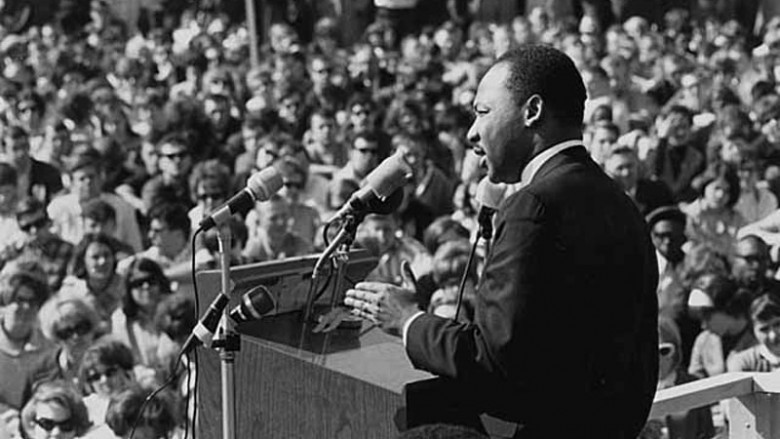Do we still dream the dream?
By Robert N. Driscoll | January 15, 2016, 6:08 EST
 (Courtesy of Wikipedia)
(Courtesy of Wikipedia) Every year, on Martin Luther King Day, NPR plays Dr. King’s 1963 “I Have a Dream” speech from the March on Washington in its entirety. I have made my children listen to it many times. Although we all know the key lines, which will be played over and over on the holiday, it is really worth listening to in full, both for its content, as well as its execution. We clearly have no public figure today with Dr. King’s rhetorical skill.
One of the things that makes the speech so inspirational today is that Dr. King was largely prophetic. He tragically predicted in Memphis in 1968, that although God had “allowed [him] to go up to the mountain” and look over to see “the Promised Land,” he would not let him “get there” with us.
But the core message of King’s 1963 speech — the equal dignity of African-Americans and opposition to government-sponsored segregation — prevailed. Congress passed the 1964 Civil Rights Act, the Voting Rights Act of 1965, and a slew of other civil rights laws. And, in a little over 45 years after the “I Have a Dream” speech, America elected an African-American president — an unthinkable concept at the time King gave his speech. Although our country may, at times, struggle to live up to its ideals, America is now a nation committed, at least in theory, to the notion of racial equality.
Against the backdrop of Dr. King’s life and the civil rights movement of the 1960s, today’s controversies surrounding government’s use of racial preferences can seem trivial. Racial set-asides for government contracts and de facto quotas for college admissions may be controversial, but many view any injustice caused by such programs as a “necessary evil” undertaken for the greater purpose of achieving equality or remedying past injustices.
What is troubling, however, is that the modern-day obsession with “proportionality” – our idea that government should ensure that college classes, government contractors, crime statistics, and nearly everything else should reflect the demographic make-up of society as whole – is an abandonment of Dr. King’s dream that one day “[we] will not be judged by the color of [our] skin but by the content of our character.”
It is easy to see why we ended up where we are with respect to governmental preferences for African Americans, long-time victims of government-enforced segregation after generations of slavery. Preferences and set-asides were originally the “goals and timetables” of the Nixon administration and a means of measuring progress and making sure that blacks, who had been previously prohibited by law or custom from many governmental opportunities, were included.
But somewhere along the way “proportionality,” rather than equal opportunity, became not a means of measuring progress, but the goal itself. Especially outside the unique context of blacks, this focus on proportionality undermines Dr. King’s dream, regardless of the superficial appeal of the “fairness” of divvying up government benefits by race.
For example, Asian students (many of whom are first generation immigrants) perform better, on average, academically than white students. This is due not to any history of pro-Asian or anti-white discrimination, but likely to cultural reasons relating to family life and the importance of education. But our colleges, in the name of “proportionality” or “diversity” discriminate in favor of whites (and every other ethnic group) and against Asians so that some rough proportionality” can be maintained.
Are Asian students being judged by the “content of their character” when they are passed over for less qualified whites because schools do not want “too many” Asians (as they once did not want “too many” Jews, the last wave of ethnic immigrants that punched above their weight academically due to cultural emphasis on family and education)?
Sadly, many Asian parents emphasize to their children that they must succeed at a high level because they will be judged differently based on their race, and their concerns are based on reality – Asians need better test scores and higher grades to get into most competitive colleges than do their non-Asian peers. Because of this, cultural pressure to do well in certain Asian communities is, unfortunately, increased. The problem with “proportionality” is that it makes this problem permanent – the more a given demographic group disproportionately succeeds, the more discrimination its faces in order for balance (in academic achievement, in successful businesses, in absence of crime) to be maintained.
Are the problems of successful ethnic groups like Asians the moral equivalent of discrimination faced by blacks in the 1960s? Of course not. But on Martin Luther King Day, it is worth considering whether our culture of “diversity” and “proportionality” is truly a means of achieving Dr. King’s dream, or an abandonment of it.
Robert N. Driscoll is a native of the Boston area who currently practices law in Washington, D.C. The views expressed in this column are his own and not those of his firm. Nor are they the views of his wife, daughters, or greyhounds. Read his past columns here.
NBPDiversity











